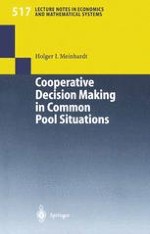2002 | OriginalPaper | Buchkapitel
Concluding Remarks and Outlook on Future Research
verfasst von : Holger I. Meinhardt
Erschienen in: Cooperative Decision Making in Common Pool Situations
Verlag: Springer Berlin Heidelberg
Enthalten in: Professional Book Archive
Aktivieren Sie unsere intelligente Suche, um passende Fachinhalte oder Patente zu finden.
Wählen Sie Textabschnitte aus um mit Künstlicher Intelligenz passenden Patente zu finden. powered by
Markieren Sie Textabschnitte, um KI-gestützt weitere passende Inhalte zu finden. powered by
In this monograph, the aim was to give an account of understanding the incentives for collective decision making in common pool problems where it is allowed for subjects to communicate with each other. We have argued that noncooperative game theory cannot provide us with a convincing explanation for observed cooperative behavior in field studies or experiments, since the branch of noncooperative game theory cannot incorporate in füll extent face-to-face communication among the subjects. Due to this methodological limitation of noncooperative game theory, we have applied a cooperative game theoretical analysis in order to give a theoretical clarification for observed mutual Cooperation in common properties. For doing so, we have studied game properties for different cooperative game theoretical representations of a common pool Situation. First, we have looked for core existence results especially, we have shown core existence for α - and β-common-pool TU games. These core existence results have provided us with a first indication concerning the incentives for collective decision making in common pool situations. In a second step we have derived the convexity result for a large dass of cooperative common pool games. This result can be interpreted as an incentive for mutual Cooperation into the grand coalition. Stability of Cooperation arises due to the fact that the core for convex games is quiet large so that the core still exists after small perturbations into the parameter space, that is, the incentives for mutual Cooperation do not vanish when an exogenous shock occurs. According to these results we can explain cooperation and stability of cooperation in common pooi problems in contrast to noncooperative game theory. These results provide us with a descriptive explanation that rational subjects can extricate by themselves from the common dilemma situation and they use the CPR with care.
